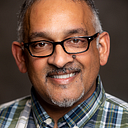Equity In Math Education Failed To Leverage Its Greatest Asset — History.
About five years ago, when I worked at a Canadian company called Scolab, I had the uncomfortable — but necessary — task of telling the mostly white employees that their avatar, Alfred, an Einstein looking character in a white lab coat, had to go. While I was advising this on a philosophical level, I mostly was advising on a business one. Having a stereotypical idea of what a mathematician looks was going to be a poor branding/marketing decision in 2018.
The shareholders and other key people listened, and Alfred was removed. The wisdom of the company in making this decision didn’t surprise me, as they were the first — and only one at the time — that took the time to put math history in their platform. This is going back all the way to 2010.
I boarded the equity train early, giving my first presentation on it in 2010. I was all in. But, even from the outset, my search for equity began in the treasure chest of math history. If we weren’t going to at least look there — if not start there — then all equity initiatives would eventually be challenged through the lens of “political correctness”. Without stockpiling the rich content which has transcended every culture, race, and civilization, equity would, in time, be challenged by people — especially white, male high school teachers.
Attaching rich content through a historical/narrative lens to marginalized groups would seem like a natural way to discuss the importance of equity in mathematics.
Giving all students equal access to mathematics that centralizes whiteness in content and purpose isn’t setting the highest bar — which is still in the firm grips of testing and transactional learning.
In fact Chris Shore, a math educator out in California, was one of the first white male educators who took the challenge to talk specifically about equity issues in math education. In 2018, at the CMC-South Conference, he did this.
My key point was that there was academic segregation of topics. White educators talk about content/pedagogy and Non-White educators talk about equity.
Almost five years later, very little has changed. We still have academic segregation at conferences, with very few white educators willing to, at least temporarily, leave their familiar pastures of content to talk about equity. Yes, some might be hesitant to come here. But, Chris Shore wasn’t, and he even addressed this in his courageous presentation.
The calcification of this ideology, that only white educators can deliver workshops on content/pedagogy, is something that has gone unchecked. That is, as long as you have visible diversity in terms of faces, then you can check off the box that conferences are progressing in equity.
Worse, a backlash towards equity initiatives is beginning to simmer. The political climate of certain States and the momentum of something as hollow as the Science of Math. Here are their contributors.
This only reinforces the stereotype of looks at who takes pedagogy/content “seriously”. The ironic thing here is that the Science of Math is a nothing burger. It’s just a ham fisting the world “science” with math for some shallow-ass marketing/branding.
There’s no math. You can wait all you want. But, it’s never coming. Godot has a better chance of showing up…
As I have been saying for years and years, math education had to expand the lens of equity to include math history — which is the richest source for content. The most important reason to bring equity into math education is that I thought it would bring better content, inclusive of all history and stories.
Even NCSM, an organization of math leadership, rejected my proposal in the strand of Untold Stories.
With that rejection, I knew content was dead at math conferences. There isn’t one other person I know of in math education who speaks exclusively in the area of math history/content. Dissonance in workshop titles is always a little problematic, but I thought a conference where “Stories” are a conference theme, that it would pretty obvious to share stories about math history — and what content/thematic development of mathematics we could learn.
How do we let Black students know that the antenna inside cell phones is based on indigenous design — that is specific to Africa?
So any expanded definition of equity, for all intents and purposes, is also dead — as we have failed to take the deepest dive of storytelling. We have neglected the actual stories of mathematicians and mathematics.
And when this happens…
All because…
I was warned by mentor Peter Harrison, two decades ago, that content was dead at math conferences. That workshops on problems, puzzles, conundrums, historical anecdotes, challenging questions, etc. that left your head spinning have been harder and harder to find.
It’s like having an empty fridge(content) and a full bookshelf of nutrition cookbooks(pedagogy).
When I made the decision to devote my education career to math history I knew I would always be a learner, that the “expertise tag” could never be applicable. That’s not a good branding movie in math education, as everyone is clamouring for those tags. That the only way to be comforted in mathematics is to be good at it. And, when you are “good” at it, then you will like it.
In the world of K to 12 math, I guess I know stuff. But, not a day goes by that I am not scrambling in the endless forest of historical content and trying to learn something new and bewildering.
At the age of 59, I just know enough to know that I know fuck all about mathematics. That is not only good enough for me, it also makes me smile — that I got glimpse of the mathematical universe. That the glimpse gave me the wisdom to be humbled and humanized by the boundless realm of mathematics.
I wish Anthony was still around…
